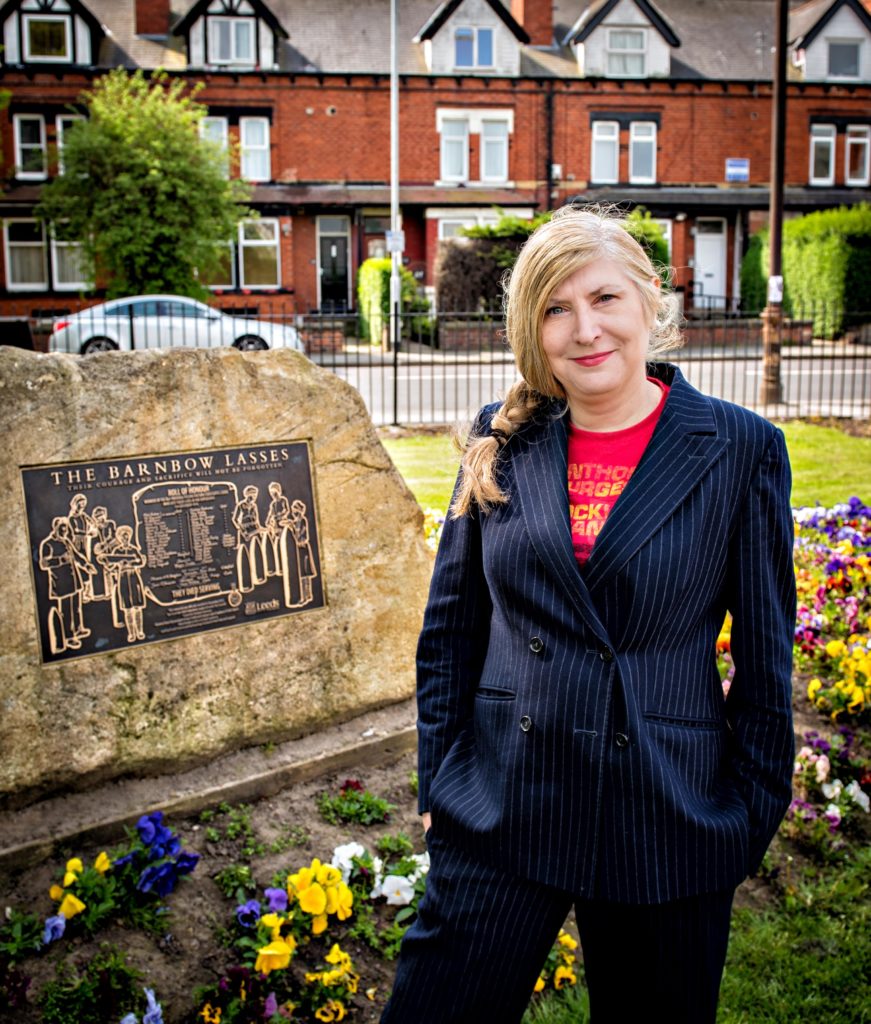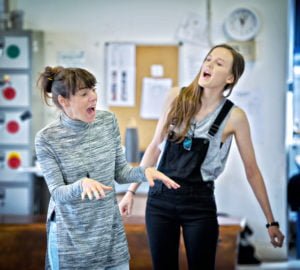Interview: Alice Nutter on writing Barnbow Canaries for the West Yorkshire Playhouse
June 12, 2016

Alice Nutter at the Barnow Lasses memorial garden in Manston Park
TOSTA’s Rich Jevons talks to writer Alice Nutter about Barnbow Canaries, her new show at West Yorkshire Playhouse.
How did you go about setting the piece in the Great War?
I’ve started off by setting it in the cinema where there is an ad for shells. Basically the reason the demand for shells stepped up was that they used more shells at {The Battle of Neuve Chapelle (10–13 March 1915)} in first 35 minutes than they thought they would use in the whole war. So this was a very different war than the Boer War. So I really wanted to show people what was happening and why they suddenly wanted munitions workers.
But this is a drama, it is not a docu-drama, so then I go into the recruitment at Barnbow. Basically what I was interested in was how working there brought them money and freedom. They were being paid brilliant money, £3 a week in the days when they were working for 2 and six as a domestic. It was the first blast of teenage years for some people – it was almost like rock’n’roll for the teenagers of the 50s. But they were making huge sacrifices and working in difficult conditions. And in the end of the war they wouldn’t be treated in the same way as the men, they were just forced back into the positions they had before.

Barnbow Canaries in rehearsal Jade Ogugua, Tilly Steele and Kristin Atherton. Photography by Anthony Robling
Can you tell us about the characters?
Agnes and Edith were two sisters who worked at Barnbow but I decided to not recreate their real lives – I wanted it to be a drama so I then went on to write about relationships between sisters. I treated them with the utmost love. Partly because the younger one dies and the other one feels responsible – I know what it is to have a sister die because my sister died in 2010. I understand what happens when someone you love has died and how in a way they are still with you and have bearing on your future actions.
What happened at the munitions factory when the explosion took place?
It was the 5th December, 10 o’clock at night, they are not exactly sure how it happened, but Shed 42 went up and there were over a hundred women in. There were a lot of injuries and in the end 35 deaths. They didn’t publicise it and you can sort of understand that because they didn’t want the Germans to find out where Barnbow was, and Zeppelins came over Leeds looking for the munitions base.
But after the war they could have publicised the women’s deaths. But people have kept the story alive by talking about it. People at Cross Gates know of relatives in the incident. When I was researching I went down to London and listened to the stuff in the Imperial War Museum and used the Reference Library in Leeds and then tried to forget the history and just write about characters.

Barnbow Canaries in rehearsal Jo Mousley & Colette O’Rourke. Photography by Anthony Robling
What other characters are included?
There is the Superintendent but I have fictionalised his character; the Welfare worker Sparrow who was actually involved with caring for the women after the explosion; and the women set up a treatment clinic at Weetwood Hall. But really I’ve tried to tell a bigger story to what happened to the women after World War One. They had proved how capable they were and done all this stuff, including being poisoned by TNT but were now forced back into domestic work and poorly paid service.
So was it a missed opportunity for women’s rights?
Before the war there was a lot agitation going on but this was put on hold out of patriotic duty. But after WW1 Lloyd George was in a position when they know if did not at least give some women the vote they would get round two of trouble. But it was only for women who owned property and were over thirty.
What would you like people to take away from the show?
I’d like people to take that sense of how important friendship is and in the bigger picture that these women came away from their experience that life could be different – that’s what I’d like people to take away that their lives could have been really different.
Runs at West Yorkshire Playhouse from 15 June to 9 July.
Filed under: Theatre & Dance
Tagged with: Alice Nutter, Barnbow Canaries, Leeds. theatre, Rich Jevons, West Yprkshire Playhouse



Comments